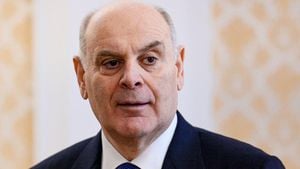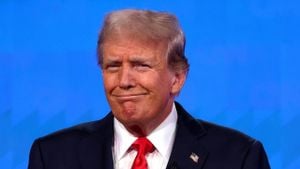Controversy erupted once again on the political scene of Maharashtra as Samajwadi Party (SP) leader Abu Azmi met with controversial cleric Mufti Salman Azhari just days before the Assembly elections scheduled for November 20. This encounter has drawn sharp reactions, particularly from the Bharatiya Janata Party (BJP), which condemned the meeting as part of an alleged strategy to garner votes through communal tensions.
BJP spokesperson Shehzad Poonawalla was quick to criticize the Maha Vikas Aghadi (MVA), the coalition of which the SP is part, stating, "Abu Azmi seeks blessings from Mufti Salman who promotes Ghazwa-e-Hindi and was arrested for hate speech." Poonawalla’s comments highlighted the BJP's concerns about the consequences of aligning with individuals perceived to be stirring communal sentiments.
The meeting’s timing and the figures involved—notably Azhari, who has been arrested previously for his inflammatory speeches—have led to accusations of vote bank politics aimed at consolidifying communal support. Nearly mirroring recent controversies, Azmi's encounter follows another contentious meeting involving NCP-SP's Fahad Ahmad and actress Swara Bhaskar with cleric Maulana Sajjad Nomani, which also ruffled feathers among the right-wing political factions.
Expressing outrage, Poonawalla referred to the MVA as aligning themselves with those who have historically opposed the Ayodhya Ram Temple and policies aimed at national integration, saying, "The shop of vote bank politics is running, and these leaders have completely forgotten what Balasaheb Thackeray stood for." He demanded clarity from Shiv Sena (UBT) chief Uddhav Thackeray about his stance on the meetings held by party members with clerics known for their divisive rhetoric.
Social media has taken up the issue, with heated discussions surrounding the legality and ethicality of such political engagements. Video footage of Azhari's past speeches, deemed hate speech by many critics, is being highlighted as evidence of the potentially dangerous affiliations being forged.
Abu Azmi, during his interaction with Azhari, discussed pressing issues affecting the constituency of Govandi. He described the meeting as part of his broader objective to advocate for the introduction of stringent laws against blasphemy. "Our mission is to establish laws against anyone who disrespects the evening of the Prophet (peace be upon him)," Azmi asserted, defending his position amid the backlash. He maintained the narrative of these meetings as not being politically motivated but rather focused on safeguarding communal harmony.
Azmi described the criticism as misplaced, claiming the demonization of Mufti Salman was unjust. He passionately argued, "Those arrested under Gujarat law are not always guilty; often they are victims of prejudice due to their faith." According to him, the Supreme Court has ruled many arrests as politically charged rather than justifiable legal actions.
The political turmoil didn’t end there; allegations of violence emerged as reports of stone-pelting attacks on NCP leader Anil Deshmukh surfaced. This incident, which resulted in injuries for Deshmukh, has prompted demands for thorough investigations to determine whether the altercation was politically motivated.
Shiv Sena leader Manisha Kayande suspectingly highlighted the potential ramifications of Azmi's meeting, labeling it as part of what she believes is orchestrated to create community rifts for electoral gains. Kayande insisted the Election Commission should step forward and investigate whether these engagements compromise electoral integrity. She indicated concerns over communal harmony and raised alarms about vote jihad—a term often pinned on tactics perceived to polarize the electorate along religious lines.
Against this backdrop, Azmi has encouraged frank discussions on communal relations, insisting he meets individuals who he believes uphold the Constitution. Not only does he advocate unity among communities, but he also chastises those who attempt to redefine the Constitution to serve their political ends.
The environment leading up to the elections is tense, fueled by incidents of aggression and allegations of divisive communal tactics. With so much at stake, the narrative surrounding these meetings continues to be closely monitored, as both parties prepare for what promises to be a heated electoral battle.
Adding to the drama, Abu Azmi criticized the ruling party’s handling of communal relations, particularly accusing them of hypocrisy. He pointed to recent rulings affecting Islamic practices, accusing the opposition of creating divisions. "When we observe discussions on prohibiting practices such as the burqa, it becomes clear their agenda isn't unity but division," he stressed.
Meanwhile, as the public discourse heats up surrounding these controversial meetings and the elections loom on the horizon, the need for responsible political dialogue has never been more apparent. With emotions running high and both sides claiming righteousness, the ability of political leaders to bridge differences could determine not just the outcome of these elections, but also the shape of Maharashtra's communal fabric moving forward.



